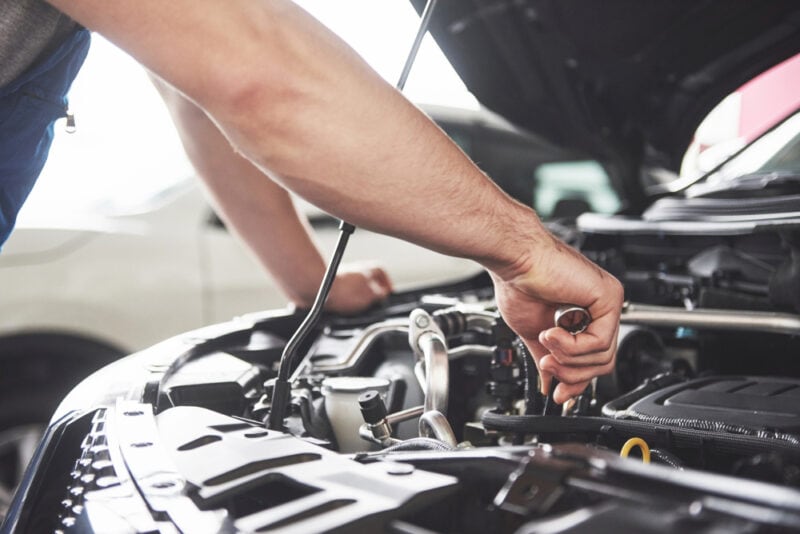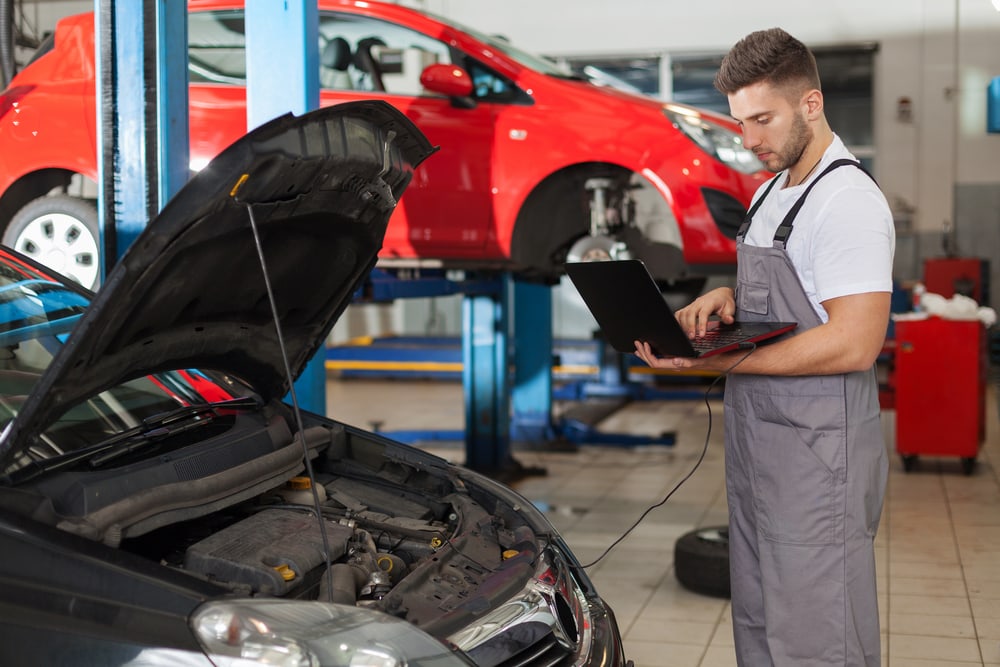How Often Should You Get Your Car a Tune-Up?

There are many steps that go into keeping your vehicle in safe working order. Many of these steps involve preventative measures that avoid major breakdowns or other issues in the future. One of the most basic aspects of preventative vehicle maintenance is the “tune-up.”
During a tune-up, a mechanic looks over some of the most common trouble spots in your vehicle. They will replace air filters, spark plugs, and oil. They will also examine parts of your car like your tires, belts, and hoses. This process aims to spot any issues and prevent others from occurring.
The question is: How often should you get a tune-up? There is no single answer to that question, as the needs of each car can differ dramatically. It is helpful to remember that every vehicle will benefit from regular tune-ups and maintenance, however. Plus, if your car is under warranty, you should perform and keep track of all regular maintenance.
When Is the Right Time to Get a Tune-Up?
If you are planning a summer road trip, you should perform maintenance prior to getting on the road. Aside from that, there are different factors that will determine how frequently you should seek out a tune-up from a licensed mechanic. This is because modern cars don’t need a tune-up in the traditional sense. In older vehicles, it was necessary for mechanics to routinely make adjustments in a vehicle to keep it running. With modern cars, computer systems take care of those issues.
According to Kelley Blue Book, the term tune-up is used to describe preventative maintenance for modern vehicles. The frequency of this maintenance also depends on the age of your vehicle.
For older cars, regular maintenance can be a constant need. You should take your vehicle in for a tune-up every 10,000 to 12,000 miles at a minimum. Time can also be a factor, meaning that you should also have your vehicles serviced at least once every year. That means it is necessary to take your vehicle in annually even if you have not yet reached the 10,000-mile marker.
New vehicles — especially those with electronic ignitions — do not need maintenance nearly as often. Instead, it is recommended to bring these cars in for a tune-up every 25,000 to 100,000 miles.
Of course, there are different types of maintenance that fall under the banner of a tune-up. Some of these types of maintenance must occur regularly, while others can be spaced out. For example, the amount of time between maintenance differs greatly between air filters and spark plugs. One of the benefits of regular maintenance is catching each of these issues as soon as possible. This type of regular maintenance could dramatically reduce expenses related to your vehicle and prevent you from finding yourself stranded by the side of the road.

5 Signs You Might Be Overdue for a Tune-up
The reality is that we all get behind on vehicle maintenance from time to time. Life can get busy, and other priorities can quickly take precedence. Watch out for these signs if you are unsure if it is time for the next round of preventative vehicle maintenance.
1. Engine Stalling
Stalling can happen from time to time, but regular engine stalling is one of the most common signs that something is wrong. There are numerous possible causes for engine stalling, and many of them could be addressed or prevented through regular maintenance. Some examples include clogged oil filters or faulty spark plugs.
2. Falling Fuel Mileage
The fuel mileage that your vehicle enjoys is not static. Over time, you can see a steady reduction in the amount of mileage you get out of your fuel. While this can be a sign that it is time for a tune-up, the problem is that changes in fuel mileage are not always noticeable.
For some people, the answer is to keep a fuel gauge handy. For others, fuel mileage can eventually fall to the point where it is noticeable. If you find yourself refilling your tank far more often than normal, it might be a sign that a tune-up is in order.
3. Starter Issues
Another common sign that a tune-up might be necessary is difficulty starting your engine. Starter problems can have many causes, but it is worth noting most of those causes could be prevented with regular maintenance. The most common example of starting issues involves a dead battery. In addition to battery issues, a tune-up could also address issues with your spark plugs.
4. Unresponsive Brakes
Unresponsive brakes could be another sign that it is time for a tune-up. Your braking system is one of the most important features of your vehicle, and there is no way to predict when you might require additional braking capacity. Over time, your brakes could become less responsive and require more roadway to come to a complete stop. Brakes decline over time, but regular maintenance could ensure that your braking system is up to date.
5. Warning Lights
It might seem obvious, but a warning light on your dashboard could be a clear sign that something is wrong. While many people don’t take check-engine lights seriously, these notifications could signal that immediate maintenance is required. To ensure that your vehicle is in safe working order, you should always have any check-engine light looked at as soon as possible.
Protect Your Vehicle with Insurance from the Best Agency
It is important to keep your vehicle running in top condition, and regular tune-ups are one way to do that. However, this is only one option for protecting your vehicle and those who ride within it. Bluefire Insurance can help your customers maximize their protection.
Are you interested in learning how Bluefire Insurance can help your auto insurance customers? If you are ready to talk about your options, you can always pick up the phone and reach us at (866) 424-9511. You could also reach us online using our contact form. We look forward to hearing from you.
Related Articles
-
 August 7th 2023
August 7th 2023The Top 10 Biggest Issues Auto Insurance Agents are Facing Today
In the post-pandemic world, insurance agents face numerous new challenges, as well as some old ones. In[...]
-
 June 17th 2024
June 17th 2024The Evolution of Personal Lines Insurance: What Independent Agents Need to Know
Ever since the development of the internet, personal lines insurance agencies have undergone a tremendous amount of[...]
-
 June 3rd 2024
June 3rd 2024Tapping into Emerging Markets: The Role of Independent Agents in Today’s Insurance Industry Trends
Insurance industry trends have shifted dramatically in the past two decades. The average client has a level[...]
-
 May 21st 2024
May 21st 2024What Does It Take to Be an Insurance Agent Today in America’s Southeast
Becoming an insurance producer can be an exciting and rewarding career path. In this job, you can[...]
